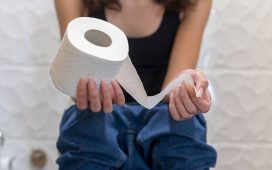DR ELLIE CANNON: How do I help my depressed husband get out of bed?
My husband is very depressed. He’s refused to get out of bed for a week and missed work. The GP says there is a six-month wait for counselling and he doesn’t want to take antidepressants. What do you recommend?
Sadly, I see a lot of cases of severe depression in practice. The mental illness can worsen quickly and it can be difficult to know where to turn for urgent help, but visiting your GP is a good place to start.
When someone has acute depression and is unable to get out of bed, counselling is not the right approach.
Instead, they should be referred to the local Crisis mental health team.
These are a team of psychiatric professionals who offer intervention quickly, usually within a day and even at home.

When someone has acute depression and is unable to get out of bed, counselling is not the right approach. (File image)
This can be life-saving if a person is experiencing suicidal thoughts and prevents them being admitted to a psychiatric hospital – something many are afraid of.
Long waiting lists are an obstacle in some areas, but treatment for depression, such as cognitive behavioural therapy is widely available so keep asking for it.
If someone won’t leave their bed, consider online therapy instead.
Many GP practices offer free, digital programmes via a website called IESO Digital. There is also an app called What’s Up offering cognitive behavioural therapy-style exercises – both this and the website are highly effective.
Often depression results from other difficulties in life, relating to financial, family or housing problems. GPs can also refer patients to resources within the community such as groups and services that offer support for these issues.
I am a 68-year-old very healthy woman who exercises three times a week and am a healthy weight. Yet my hips ache. It hurts when I walk for long distances and I have to sit down. Do I have arthritis?
Every 68-year-old will have some degree of wear and tear to their joints, also called osteoarthritis – the most likely culprit for achy hips.
Being a healthy weight is a good defence, providing you don’t overdo the exercise.

Every 68-year-old will have some degree of wear and tear to their joints, also called osteoarthritis – the most likely culprit for achy hips. (File image)
Although regular physical activity reduces stiffness in the joints and bones, intensive fitness regimes puts strain on the joints and can cause arthritis.
Focus instead on strengthening muscles to support the joints with low impact exercises.
Swimming or cycling are great options, and warming up and stretching afterwards is absolutely vital.
Other joint problems could cause achy hips – ligament inflammation, impingement syndrome or bursitis, where the fluid within the joints swells. In these cases, the pain will be more obvious on one side.
A consultation with a GP or a physiotherapist will establish the exact cause. Scanning the hips with an X-ray can diagnose arthritis or bone damage, but little else.
A more detailed MRI scan, however, can spot bursitis and ligament issues.
Initially, all of these conditions are treated with specific exercises, rest and anti-inflammatory medication.
Fighting the loneliness epidemic starts with installing more public toilets on our streets.
A nationwide shortage means thousands of Britons won’t leave the house in case they get caught out, according to the Royal Society of Public Health.
This is a constant struggle for my patients suffering conditions such as bowel disease, prostate problems and diabetes.
This is not just a matter of convenience. It is a serious health problem.














